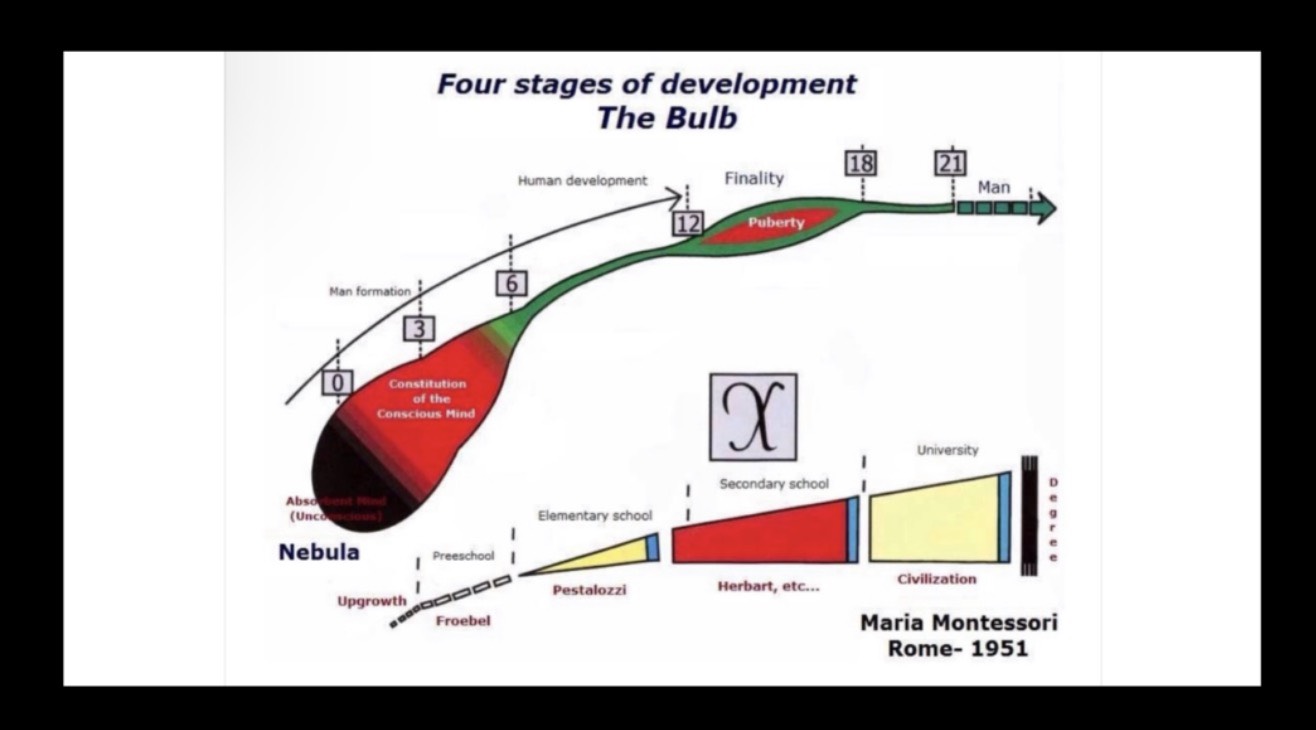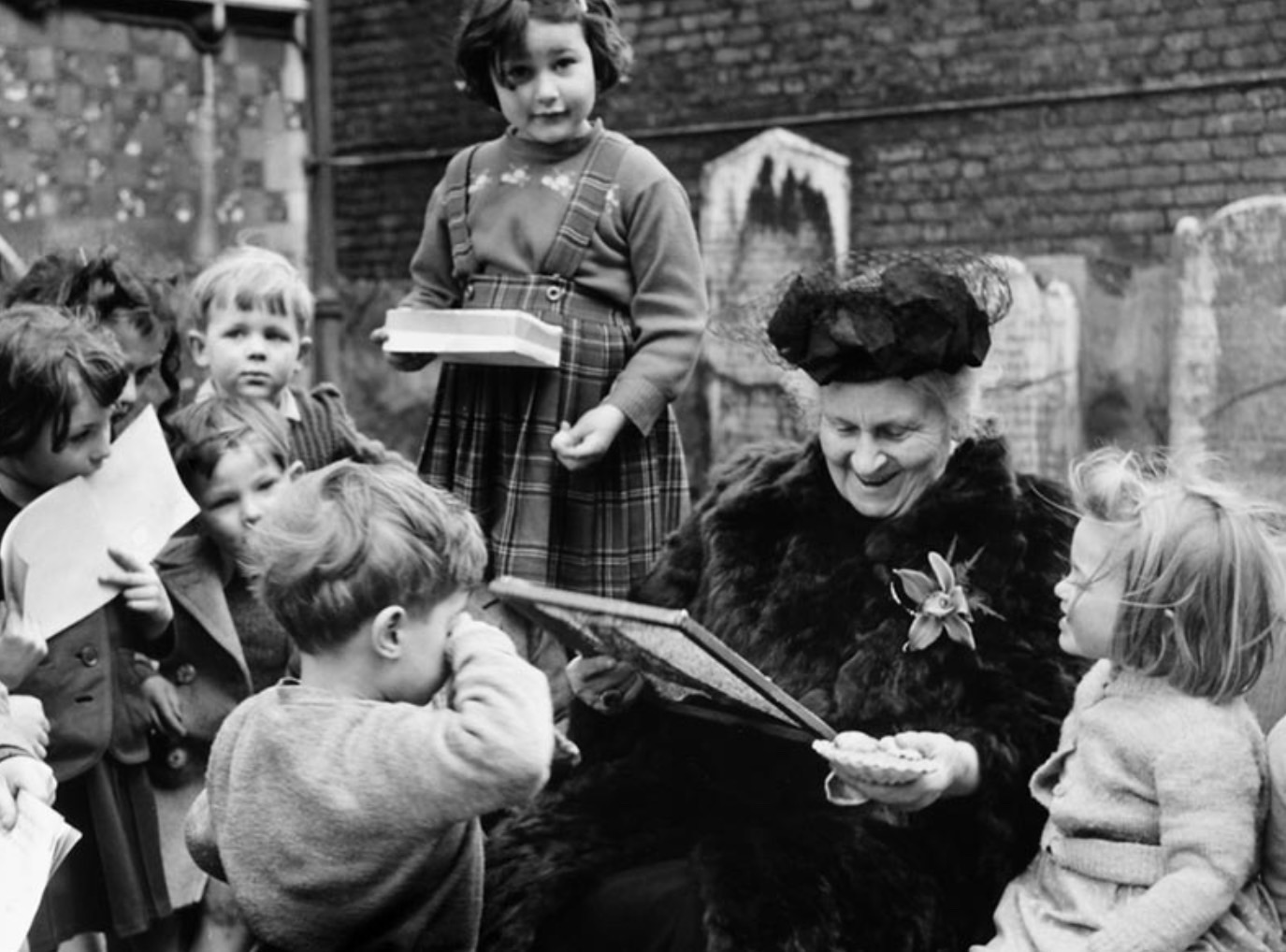モンテッソーリ教育
~ Montessori Education
モンテッソーリ教育はイタリア初の女医の一人、マリア・モンテッソーリ博士によって作られました。彼女は医者として冷静に子どもを観察し、子どもには自分の力で自分を成長させる「自己形成力」があることを発見します。私達大人は「教える」のではなく子どもに仕えるように働きます。私達は子どもの成長に適した環境を整え、子どもが自分で成長するのを間接的にサポートします。
Montessori education was created by Dr. Maria Montessori, one of Italy's first female physicians. As a doctor, she calmly observed children and discovered that children possess a "self-forming power" to grow on their own. We, as adults, work to serve children rather than "teach" them. We arrange an environment conducive to the child's development and indirectly support the child in growing on their own.
奈良モンテッソーリ子どもの家には、子ども達の自己形成のために常時以下の棚またはコーナーが設置されています。子ども達は自由に選択し、活動します
1.日常生活の練習コーナー
日常生活の練習を通して子ども達は自律し、環境に適応します。
活動を通して運動能力を獲得し、洗練させます。これが後の様々な活動に繋がります
2.心理感覚運動の活動コーナー
マリア・モンテッソーリは手の発達は心理感覚運動の発達と知性の発達に必要だと強調しました。
子ども達は自分の発達段階に合った教具を選んで活動に集中します
垂直棒と立方体 水平棒とディスク ひも通し 縫いさし のり貼り パズル ハサミを使う など
3.言語のコーナー
言語のコーナーは、語彙の拡充を目指した棚です。実物やレプリカ、様々なカードを子どもが選びやすいよう数を制限して配置しています。また飽きないよう定期的に中身を変えています。
絵本のエリアには日本語と英語の絵本があります。子どもの混乱を避けるため5~7 冊のみをローテーションで配置します。子どもはひとりで絵本を見たり、日本人や英語対応スタッフから読み聞かせをしてもらったりします。
4.アートコーナー
自己表現をするために粘土、クレヨン、チョーク、絵の具などが用意されています。
大きなイーゼルに向かって思い切り筆やチョークで描くことは粗大運動の発達にも繋がります
5.音楽のコーナー
様々な楽器がローテーションで設置されます。子どもは自由に楽器を楽しみ、音楽に合わせシャカシャカドドコドコ演奏します。楽器の絵を見ながらその音のCDを聴き、楽器の理解を深めるコーナーもあります
6.食のコーナー
食の準備するための様々な道具が置かれ、必要に応じて使用します
7.トイレットラーニング
モンテッソーリ教育ではトイレトレーニングは「トイレットラーニング」と呼びます。排せつの方法を「学ぶ」という考え方です。子どもの家では子どもが自分で排せつ出来るように環境を整えます。自由にアクセス出来るトイレ、自分で着脱出来る布パンツ(エコニコパンツ)の使用、自分で座って着脱出来るベンチ、などを使用しトイレの自立を学びます。
8.お庭活動のコーナー
子どもサイズのほうきやちりとり、シャベルなどがあり、お庭で活動したいときに使います
MONTESSORI EDUCATION in More Detail
モンテッソーリ教育を更に詳しく
モンテッソーリ教育とは
整えられた環境
子ども達は教えなくとも努力し、一人で立ち上がります。モンテッソーリ教育では大人は子どもをじっくり観察し、子どもが
敏感期(※1)に得られる能力をしっかりと獲得出来るよう、最適な環境を物的にも人的にも準備します。例えば子どもが使いやすいよう家具や道具を子どもサイズにし、大人はゆっくりと、ひとつひとつの使い方を分かりやすく示します。成長のために整えられた環境の中で、子ども達は自分の力で自分に内在する能力を開花させます。獲得した能力を使い、積極的に子どもの家で活動し、社会生活に適応する一歩をスタートさせます。子どもの家での主人公はあくまで子ども達であり、大人たちは黒子のように、「教える」のではなくお手伝いに回ります。このような大人の態度も整えられた環境の一部です。
吸収精神
マリア・モンテッソーリは、
発達の4段階(※2)の第1段階(0~6 歳)の子どものみに見られる特殊な精神を、長期間のインド滞在中に発見しました。そして吸収精神と呼びました。子どもが環境にある物全てを獲得し、自己を作り上げていく力で、まるでスポンジが水を吸い上げるかのような精神です。
0~6 歳に現れる吸収精神は2つに分かれています。0~3歳児は「無意識の創造者」と呼ばれ、無意識に環境にある物を吸収します。内部から湧き出る衝動により、五感を使って物事の詳細までぐんぐん吸収します。例えば言葉、動き、文化的な慣習、習慣、価値観などに加え、周りにいる人の気持ちや態度も吸収していきます。
3~6歳児の吸収精神は0~3歳児のものとは異なります。「意識的な作業者」と呼ばれます。0~3歳児とは異なり、自らの意志で選択したものを吸収します。この時期の子どもは既に動いたり、話したりの調整が出来て、ある程度の自立は獲得しています。0~3歳までに獲得した能力を自分の意思で強化し、洗練していく時期です。
※1 敏感期とは
敏感期は吸収精神と並び、モンテッソーリ教育の2本の柱と言えます。マリア・モンテッソーリは子どもが「特定の時期」に非常に固執して「特定のこと」をすることを発見しました。この「特定の時期」を敏感期と呼びます。
例えば1,2歳児は非常に何かにこだわりを見せます。「秩序の敏感期」だからです。敏感期に子どもが何かに集中している時、肉体的にも精神的にも生きていくうえで大切な能力を獲得しているのです。集中して繰り返し、その能力を獲得できた子どもは、身体面でも精神面でも、まるで生まれ変わったように変容します。保護者は子ども達の敏感期を知ることで、彼らが能力を獲得しようと、ある行動をひたすら繰り返すのが理解できます。この時期に最適な環境を与えると子どもは努力なしに、楽しく最大限にその能力を獲得します。
0~3歳までの子どもに関連する敏感期には以下のようなものがあります(諸説あります)
※2 発達の4段階とは
マリア・モンテッソーリは人間の発達段階を以下の4つに分類しました。各段階は更に2つに分けられます
- 第1段階 0~6歳 乳幼児期
- 第2段階 6~12歳 児童期
- 第3段階 12~18歳 思春期
- 第4段階 18~24歳 青年期(成熟期)
モンテッソーリは0から6歳の時期にこそ教育に最も力を入れるべきだと言います
「生涯のうちで最も大切な時期は、大学での勉学に相当する時期ではなく、むしろ誕生から6歳までの第1の時期である、と。この時期にこそ、人間の偉大な道具である知性が形成されるからです。さらに知性だけでなく精神的な機能全体が形成されるからです。」
「子どもの精神」p 29
引用文献
モンテッソーリ・マリア著 中村勇訳 「子どもの精神―吸収する精神―」
公益財団法人 才能開発教育研究財団 日本モンテッソーリ教育綜合研究所 2020年第7版発行

Montessori Education
At Nara Montessori Children's House, children freely choose what they want to explore. Shelves and learning corners are designed, stocked, and arranged specifically for each of the following themes:
1. Exercise of Practical Life Area
Through the exercise of practical life, children learn self-discipline and adapt to their environment. Furthermore, these activities contribute to the acquisition and refinement of motor skills needed for various future endeavors.
- Care of the Person:
Activities that allow children to independently manage personal tasks include brushing hair, wiping the nose, handwashing as an exercise, using dressing frames, brushing teeth, polishing shoes, and more.
- Care of the Environment:
Activities that allow children to adapt to the environment and to keep it beautifully include dusting, cleaning glass, flower arranging, polishing mirror, watering plants, washing cloths, sweeping, and more.
2. Aids to psycho-sensory motor development
Maria Montessori emphasized the importance of hand development for intellectual growth and psycho-sensory motor development. Children choose tools, such as cubes on vertical dowel and discs on horizontal dowel, that match their developmental stage. They also focus on bead stringing, sewing, gluing, puzzles, using scissors and more.
3. Language Corner
Children’s vocabulary expands by using actual items, replicas, and various cards. The items are limited in number to make it easy for children to choose. To keep children engaged, the contents are regularly rotated.
Japanese and English books are also displayed. To avoid overwhelming the children only 5 to 7 books are available at any one time. Children explore books on their own or enjoy listening to Japanese and English-speaking guides read to them.
4. Art Corner
To foster children's self-expression, various art supplies such as clay, crayons, chalk, and paint are provided. Using a large easel to freely hold brushes and chalk contributes to the development of gross motor skills.
5. Music Corner
Various instruments are set up on a rotational basis. Children can enjoy playing instruments, play together in rhythm, and explore understanding of instruments by listening to corresponding CDs with instrument picture cards.
6. Food Corner
Various tools for preparing meals are used as needed.
7. Toilet Learning
In Montessori education, toilet training is "toilet learning," emphasizing what we do to control and empty the bowel and bladder. At Children's House, our environment is arranged to enable children to learn how to manage toileting by themselves. This includes providing access to the toilet at all times, using cloth pants (Econicopants) that the children put on and take off by themselves, and utilizing a child-sized bench for sitting and dressing.
8. Outdoor Activities Corner
Children use Child-sized brooms, dustpans, shovels, and more when they want to engage in outdoor activities.
MONTESSORI EDUCATION
in More Detail
Montessori Education in More Detail:
Prepared Environment
Children, even without explicit instruction, exert effort and stand up on their own. In Montessori education, adults closely observe each child and make decisions to ensure an optimal environment for each child to acquire the skills each encounters during
the sensitive periods (※1).
For instance, furniture and tools are sized for children's ease of use. Adults slowly and clearly demonstrate how to use them. Within an environment tailored for development, children blossom. They actively engage in activities at Children’s House and take the first step in adapting to social life. The protagonists in Children's House are always the children, and the guides play a supporting role, acting like shadows, facilitating the children's growth rather than "teaching." Such an attitude is also part of the prepared environment.
The Absorbent Mind
During Maria Montessori’s extended stay in India, she discovered a unique phenomenon observed only in
the first stage (0 to 6 years)※2 of development. which she named the "absorbent mind." A child absorbs details in their surroundings, much like a sponge absorbs water.
The absorbent mind in the 0-6 age range is divided into two developmental stages. 0 to 3 years old are called "unconscious creators," absorbing things in the environment unconsciously. Driven by internal impulses, and using their 5 senses, they absorb details in language, movement, culture, customs, habits, values, and even the feelings and attitudes of those around them.
The absorbent mind in 3 to 6 year olds differs from that of 0 to 3 years old. It is termed "conscious workers." Unlike 0 to 3 year olds, 3 to 6 year olds choose what they absorb. Children in this stage have already acquired some level of independence, being able to move and speak. Now they intentionally strengthen and refine the abilities they acquired up to age three.
Sensitive Periods (※1):
The absorbent mind and sensitive periods constitute the two pillars of Montessori education. Maria Montessori discovered that children become intensely focused on specific activities during certain periods, which she termed "sensitive periods." For instance, 1 to 2 years old show a strong attachment to particular things during the "period of order." During these sensitive periods, children acquire crucial abilities for physical and mental well-being by concentrating and repeating activities. Once acquired, children undergo a transformative change, both physically and mentally.
Various sensitive periods related to children from 0 to 3 years include:
- Sensitive Period for Language (from around 7 months in utero to 2 years)
- Sensitive Period for Order (peaking from birth to 1.5-2 years)
- Sensitive Period for Small Objects (around 2 years)
- Sensitive Period for the Senses (0-3.5 years, tactile sense from 2 to 3 years)
- Sensitive Period for Movement (acquisition period from birth to around 2.5 years)
- Sensitive Period for Socialization (from birth to 6 years, peaking from 3.5 to 6 years)
Four Stages of Development (※2)
Maria Montessori classified human development into four stages, each further divided into two:
- Stage 1: 0-6 years - Infancy and Early Childhood
- Stage 2: 6-12 years - Childhood
- Stage 3: 12-18 years - Adolescence
- Stage 4: 18-24 years - Adulthood (Maturity Period)
Dr. Montessori emphasizes that the period from 0 to 6 years is the most crucial for education, asserting that this is when human intelligence, and not just intellect, is formed. She contends that the most significant time in a person's life is not during university studies but during the first six years from birth.
“Now that the psychologists have come to study life, there is a tendency to go to the other extreme,and there are other people besides me who say that the most important part of life is not the university, but the first period, the period that extends fro m 0 to 6 years. Because it is during this first period that intelligence, the great instrument of man, is formed; and not only intelligence, but the whole of the psychic faculties is constructed during this period.”
Maria Montessori “The Absorbent Mind” 30p
First Start Publishing eBook edition October 2012
Manufactured in the United States of America




